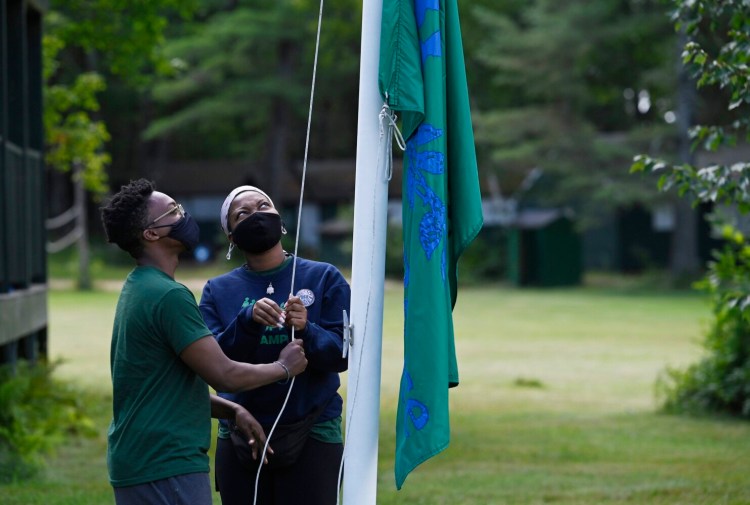OTISFIELD — On their first morning of camp, 70 teenagers wearing matching blue and green Seeds of Peace sweatshirts gathered on the field where more than 7,000 campers before them have come from across the globe to talk about deep divides and how to find common ground.
But this summer, for the first time in its 28-year history, the camp is devoting a session exclusively to teens from Maine.
Originally created to bring together Palestinian and Israeli teenagers to seek common ground, Seeds of Peace has expanded over the years to include other Middle Eastern countries and teenagers from the United States. But the pandemic kept the camp in Otisfield closed last year, and it’s still not possible for international students to travel to Maine because of COVID travel restrictions.
So the focus this year turned to campers, or Seeds as they’re called here, from Maine and the northeast. With protocols for testing and masking in place, the camp opened this year in July with a session that included teens from other New England states and New York. But the second session is for Maine students only for the first time since the camp launched in 1997.

Campers and counselors at Seeds of Peace approach the field for opening ceremonies on Monday. Campers will explore the deep divides in American society, including race, religion and political differences, while developing the skills and confidence to address conflicts in their own schools and communities. Shawn Patrick Ouellette/Staff Photographer
“They come from across the state, from urban and rural areas, and a variety of backgrounds. We have New Mainers and people whose families have been here for generations,” said Josh Thomas, the executive director. “We’re bringing young leaders together across deep divides. This a chance to have the conversations that are hard to have in everyday life.”
The 70 teenagers from 21 high schools from Scarborough to Brewer will spend 18 days exploring the deep divides in American society, including race, religion and political differences, while developing the skills and confidence to address conflicts in their own schools and communities. Many of the staff members and counselors they will spend time with are Seeds from Maine who first came to the camp as high school sophomores and juniors.
After camp is over, the Seeds will continue working with the Maine Seeds leadership program through year-round local and school-based activities that aim to bridge divides and create positive change in the community. Seeds of Peace launched Maine Seeds, its first U.S.-focused initiative, in 2000 to address tensions in Maine from rapidly changing demographics.

Counselor Danielle Whyte speaks to counselors and campers during opening ceremonies at Seeds of Peace on Monday. She praised the campers for coming to the camp and stepping out of their comfort zones. Shawn Patrick Ouellette/Staff Photographer
On Monday morning, the Seeds and staff gathered on the field for the traditional opening ceremony and flag raising. The counselors and staff from Maine took turns sharing with the Seeds their own experiences, advice and hope for the session.
“Maine is a complicated place. On the surface it can seem like it’s a pretty simple place,” camp co-director Spencer Traylor told the new Seeds. “Maine has a complicated history. Different people in this place have not always been as welcome as other people have been. That is real. We all have ways that show up in our communities.”
Traylor described moving to Milo at age 12 and seeing a DVD about the town’s history that included images of the KKK walking down Main Street during the first daylight march in the country.
“I was not sure where my place was in Maine until I came here, until I was at Seeds of Peace and met people from all across the state, until I looked people in the eyes and got to see them not just for the color of their skin, not just for the religion they had, not for the person their family members voted for or where they lived,” he said. “I came to really understand the humanity of the people sitting next to me. You all have those opportunities to actually see each other.”

Counselor Sophie Warren, a onetime Seed who’s now a Maine lawmaker, works at Seeds of Peace on Monday. Shawn Patrick Ouellette/Staff Photographer
Counselor Sophie Warren first came to Seeds of Peace as a Seed in 2011 and returned for the two following years. Now a state representative from Scarborough, she said she “wouldn’t be the person I am today without some of the fundamental values I got from Seeds.”
“When I think of Seeds of Peace, I think of how to be an empowered young person to make the change I want to see in my community,” Warren said.
Danielle Whyte first came to Seeds of Peace as a high school student in Portland and now leads community action at the camp. She praised the campers for their decision to come to the camp and step out of their comfort zones.
“While you are here, these abstract concepts of peace, of leadership, of justice shall become concrete because you are those concepts,” she said. “When you leave camp, you will become peace. You will become leadership. You will become justice. Because we cannot have what we are not willing to become. In that sense of becoming, it starts with you.”
Copy the Story LinkComments are not available on this story.
Send questions/comments to the editors.



